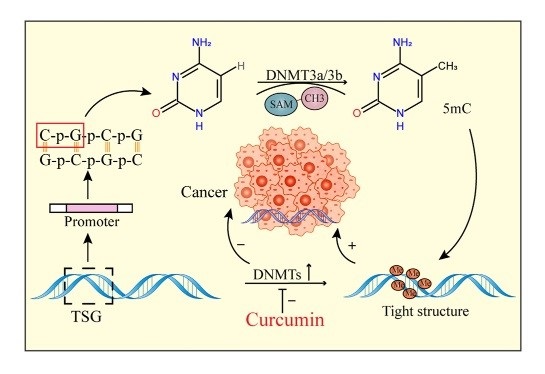Cancer is the leading cause of death in humans and one of the most important obstacles to prolong human life expectancy. Many factors, including diet, obesity, alcohol addiction and overwork, are involved in the incidence of multiple malignancies. Despite the continuous advance in biomedical sciences, cancer morbidity and mortality are still on the rise worldwide.
Aberrant epigenetic regulation plays a crucial role in cancerous development, particularly metastasis that is an important cause for the death of patients with cancer. Epigenetics (DNA methylation, histone modifications and non-coding RNA, etc.) is a discipline that studies heritable changes in gene expression without alteration of DNA sequence. DNA methylation plays a vital role in the pathogenesis of many diseases by regulating gene expression, and it is currently a research subject of interest in the epigenetic field. Numerous lines of evidence indicate that hypermethylation in the DNA promoter region of genes, including tumor suppressor gene (TSG), results in subsequent gene silencing.
High level of DNA methyltransferase (DNMT) and alteration in DNA methylation are found in multiple types of cancer, and DNA hypermethylation in TSG promoter is a significant characteristic for transcriptional inhibition of TSG. DNMT mainly includes DNMT1, DNMT3a and DNMT3b, and its overactivation is usually associated with tumorigenesis. Therefore, the restoration of DNA methylation may serve as a therapeutic approach for cancer in the foreseeable future. For instance, inhibitors of DNMT exhibit strong efficacy against some malignancies.
Curcumin is an acid polyphenolic compound widely present in the plants of the Curcumae longae species with multiple pharmacological effects. Curcumin has strong bioactivity against various disorders, particularly cancer. Emerging evidence reveals that curcumin exerts inhibition on DNMT. For instance, curcumin deters cancer cell proliferation and induces apoptosis by inhibiting DNMT (DNA methyltransferase) activities, thus affecting DNA methylation to exert anticancer effect. However, the interaction between curcumin and DNA, which is still elusive, merits in-depth investigation in the future.
Reference
[1] Ming T, Tao Q, Tang S, et al. Curcumin: An epigenetic regulator and its application in cancer. Biomed Pharmacother. 156 (2022) 113956.
[2] J. Zhao, H. Li, S. Zhao, E. Wang, J. Zhu, D. Feng, Y. Zhu, W. Dou, Q. Fan, J. Hu, L. Jia, L. Liu, Epigenetic silencing of miR-144/451a cluster contributes to HCC progression via paracrine HGF/MIF-mediated TAM remodeling, Mol. Cancer 20 (1) (2021) 46.
[3] J. Liu, H. Zhao, Y. Huang, S. Xu, Y. Zhou, W. Zhang, J. Li, Y. Ming, X. Wang, S. Zhao, K. Li, X. Dong, Y. Ma, T. Qian, X. Chen, Z. Xing, Y. Zhang, H. Chen, Z. Liu, D. Pang, M. Zhou, Z. Wu, X. Wang, X. Wang, N. Wu, J. Su, Genome-wide cell-free DNA methylation analyses improve accuracy of non-invasive diagnostic imaging for early-stage breast cancer, Mol. Cancer 20 (1) (2021) 36.
[4] M.A. Argentieri, S. Nagarajan, B. Seddighzadeh, A.A. Baccarelli, A.E. Shields, Epigenetic pathways in human disease: the impact of DNA methylation on stress-related pathogenesis and current challenges in biomarker development, EBioMedicine 18 (2017) 327–350.
[5] B. Stefanska, H. Karlic, F. Varga, K. Fabianowska-Majewska, A. Haslberger, Epigenetic mechanisms in anti-cancer actions of bioactive food components–the implications in cancer prevention, Br. J. Pharmacol. 167 (2) (2012) 279–297.
2024/10/04 updated.

